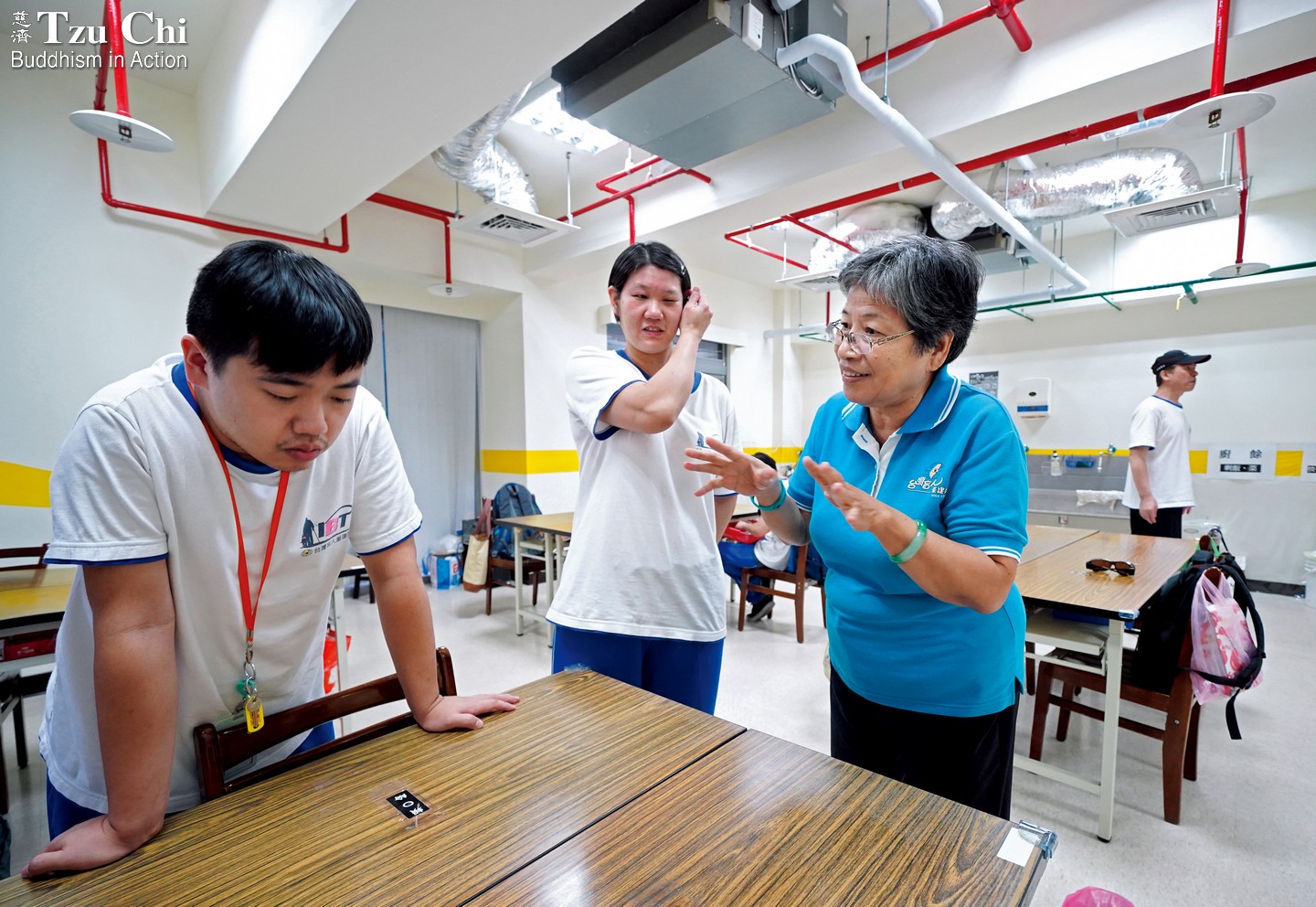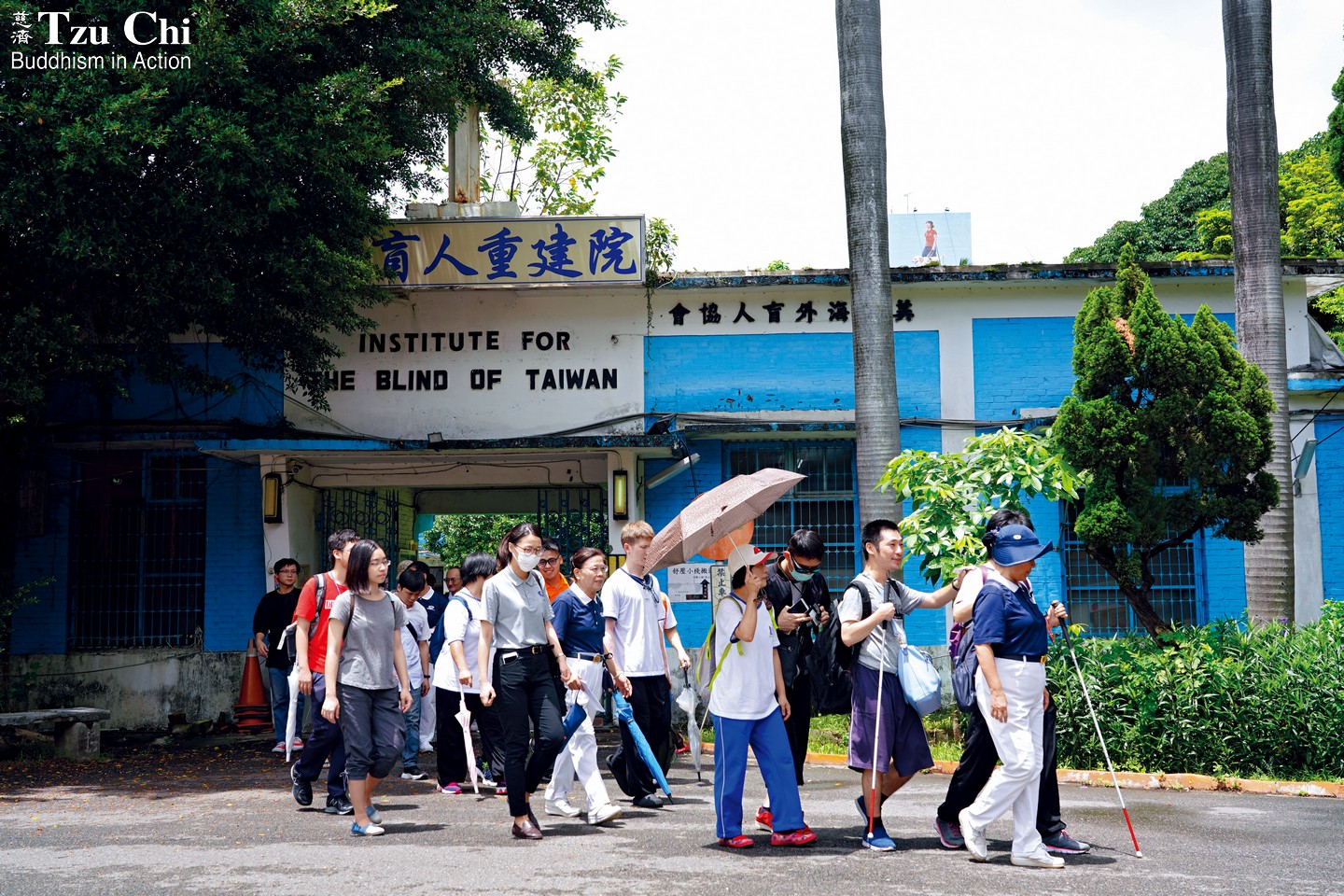By Chen Li-an
Translated by Wu Hsiao-ting
Photos by Hsiao Yiu-hwa
I hope more people learn about the Institute for the Blind of Taiwan so that more visually impaired people can receive help sooner. It’s important to pass on experience and expertise. I’ll do my best to contribute as long as I still can.
—Zhang Zi, head of the Institute for the Blind of Taiwan

Zhang Zi (first from right) has served the visually impaired for over four decades. She is a proponent of assessing the needs of each non-sighted person to offer assistance that best suits them.
Once the principal of the Taipei School for the Visually Impaired, and now at the helm of the Institute for the Blind of Taiwan (IBT), Zhang Zi has served the non-sighted for 45 years. A major part of her life—her prime years actually—has been dedicated to the education of the visually impaired.
Zhang graduated from a teachers’ university in 1975, the same year the Taipei School for the Visually Impaired was established. Because she had intern experience in the field of special education, Zhang was offered a teaching spot at the Taipei school. Back then, non-sighted people rarely ventured out of their homes, and Zhang had never even met a blind person before she joined the school. Although she was nervous about teaching there, she accepted the challenge, and thus began her career in special education.
Zhang explained that almost all the school’s students had been born blind. With no visual experience to guide them, they built their worlds based on their imaginations. Though they couldn’t see, Zhang believed in their right to receive a quality education. Whether the students were learning good habits, good character, or the methodology of going about a task, she believed the standards shouldn’t be lowered because of their visual impairments. On the contrary, even more care should be applied to their education, starting with the teaching materials selected for them.
Special education is different from general education. Zhang emphasized the need to care for not just the students but their families as well. She remembered a student’s mother who had tried to take her own life several times. The woman’s husband had walked out on her and their child because the latter was blind. She felt hopeless as a result, which had led to her suicide attempts. Zhang was in the late stages of her own pregnancy when she learned about the family’s situation, but, giving no thought to herself, she said to the mother, “You can’t die! I’ll help you!”
Zhang bent over backwards to help the family. She visited a masseur she knew well and implored him to take on the student as an apprentice to help lighten the family’s financial burden. Happily, everything turned out well in the end, and a possible tragedy was averted.
Zhang expended a lot of effort on cases like this one, and she helped a lot of students’ families. She learned from her experience that educators can do more than just impart knowledge to students—they can make more of an impact in their students’ lives.
Community outreach
In 2004, after serving for nearly 30 years, Zhang retired from the Taipei School for the Visually Impaired. Four years later, she was offered the position to lead the Institute for the Blind of Taiwan. She accepted and thus began the next phase of her career serving the visually impaired.
It’s not easy to keep the institute in operation, but Zhang does her best to maintain the institute and its staff. She knows that if professional support for the visually impaired runs short, the quality of education and counseling for this group of people is bound to suffer. She also understands the importance of passing on experience and expertise. She lives by her words when she says, “I’ll do my best to contribute as long as I still can.”
Zhang declared that even though she has served the visually impaired for nearly half a century and has accumulated a lot of experience, she still has to relearn a lot of stuff every time she encounters a new case. Every individual is different and has different needs; adjustments need to be made in the process of tailoring help for them so that their needs can be effectively served. Despite the efforts it takes to serve the non-sighted, Zhang said, “When you see them smile, you feel you’re doing a very meaningful thing.”
It has been more than 60 years since the IBT came into existence. Over a major part of that history the institute “silently” helped the visually impaired—until a few incidents happened that prompted the IBT to make changes. In a ceremony marking the completion of a massage course one year, Zhang heard a student say, “If I’d known that my life would become so much fun after I received vocational and life skills training at the IBT, I’d never have let those ten years before I joined the institute go to waste.”
Zhang declared that those words were a huge blow to her. She thought to herself at that time, “Is it due to insufficient publicity about our institute that people like that student stay cooped up in their homes for that long?”
Another time, a resident of Xinzhuang, where the IBT is located, said that when he first came to the institute to volunteer, he had had no idea what the institute did—despite having lived in the district for more than 40 years!
These incidents prompted the administrators of the IBT to survey the surrounding areas to find out how many visually impaired people lived locally. They were surprised to find that in Xinzhuang alone—about 20 square kilometers (7.7 square miles) in area with a population of about 420,000—there were over 400 visually impaired people. What’s more, the IBT had not even encountered these people. Many of them couldn’t take care of themselves, nor had they ever received orientation and mobility training. Because they couldn’t see, they assumed they’d never be able to work again. As a result, their sphere of activity was limited to their homes.
To make the services of the IBT known to more people and also to give back to the local community, the institute began organizing community activities and classes to entice the local non-sighted population to step out of their homes and live a more enriched life. Their intentions were good and the activities and classes were free for participants, but things didn’t go well in the beginning. “Most people thought we were a gang of swindlers,” Zhang said with a wry smile.
To make breakthroughs, she decided to enlist the help of neighborhood chiefs, who knew the situations of families in their neighborhoods better than most other people. At Zhang’s request, local neighborhood chiefs accompanied IBT personnel on their visits to families with non-sighted members to encourage participation in the institute’s events and classes. Zhang’s strategy was quite successful and participation grew. With increased participation, classes organized by the IBT also grew more diverse, including ballroom dancing, singing, cooking, balloon modeling, etc. Today, the number of course enrollments has reached nearly 4,000 every year—although some people participate in multiple class offerings each year.
The institute also holds workshops for the families of the visually impaired and for the general public which allow participants to experience what it would be like if they couldn’t see. This is to foster people’s understanding of what it would be like to be blind, and to help them become more empathetic. In addition, workshops are offered for children to help them understand the importance of protecting their vision. These are provided to help lower the instances of acquired blindness.
The IBT does not charge any fees for its vocational and life skills training, nor for the community classes it offers. Zhang once asked Zeng Wen-xiong (曾文雄), the founder of the IBT, why they didn’t charge anything, especially as the institute found itself in the red every year. Zeng replied that when people lose their vision, it is a serious blow to their families’ finances. If the institute charged people who were already struggling financially for taking part in IBT courses, it might further deter them from stepping out of their isolation. “We can make life easier for them if we work harder to raise money,” said the founder. “Once they get back on their feet, they’ll be able to turn their lives around.”
Following in their founder’s footsteps, the IBT staff has done their best to solicit donations or seek help from other charitable resources to keep the institute in operation. They want to ease the financial burdens of non-sighted people and their families. Zhang sincerely hopes that organizations like the IBT can always stay in operation. “No one can guarantee that vision loss will never happen to themselves or others. We must keep our services going and keep on improving them.”
As the IBT continues to serve the visually impaired, Zhang hopes that more people will learn about the institute so that more visually impaired people can receive help sooner. In addition to serving the needs of the non-sighted, the institute can also play a role in nurturing the public’s understanding of the visually impaired and help them realize what help they can offer them. Perhaps everyone can start by not shying away from this group of people. Next time you run into a blind person, don’t hesitate to reach out and ask, “Do you need help?”

Accompanied by Tzu Chi volunteers and IBT staff, participants of a massage course at the institute set out for an out-of-school practice session. Many people have, with the institute’s help, started their lives anew after losing their sight.



